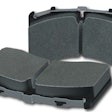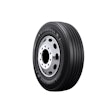At its Movin’ On summit in Montreal on Wednesday, Michelin said that by 2048 all of its tires will be manufactured using 80 percent sustainable materials and that 100 percent of all its tires will be recycled.
The global recovery rate for tires is about 70 percent, and the recycling rate currently is 50 percent.
Michelin tires are currently made using 28 percent sustainable materials – 26 percent bio-sourced materials like natural rubber, sunflower oil and limonene, and 2 percent recycled materials like steel or powdered tires. In the years ahed, Michelin is investing in high technology recycling technologies to be able to increase this content to 80 percent sustainable materials.
Christophe Rahier, Michelin’s director of high technology materials business line, says the path to this target will be achieved by research programs into bio-sourced materials like Biobutterfly and working with partners, and the advanced technologies and materials that are being developed in these partnerships. Launched in 2012 with Axens and IFP Energies Nouvelles, the Biobutterfly program seeks create synthetic elastomers from biomass such as wood, straw or beet.
Michelin recently acquired Lehigh Technologies, a specialty chemical company that is part of the High Technology Materials Business Unit of Michelin. Lehigh is the leader in the market for Micronized Rubber Powders (MRP), a sustainable raw material that reduces feedstock costs by up to 50 percent and delivers performance without compromise across a wide range of markets.
MRP replaces oil- and rubber-based feedstocks in a wide range of industrial and consumer applications, including high performance tires, plastics, consumer goods, coatings, sealants, construction materials and asphalt. Lehigh technical experts collaborate with customers to optimize products for each application.











